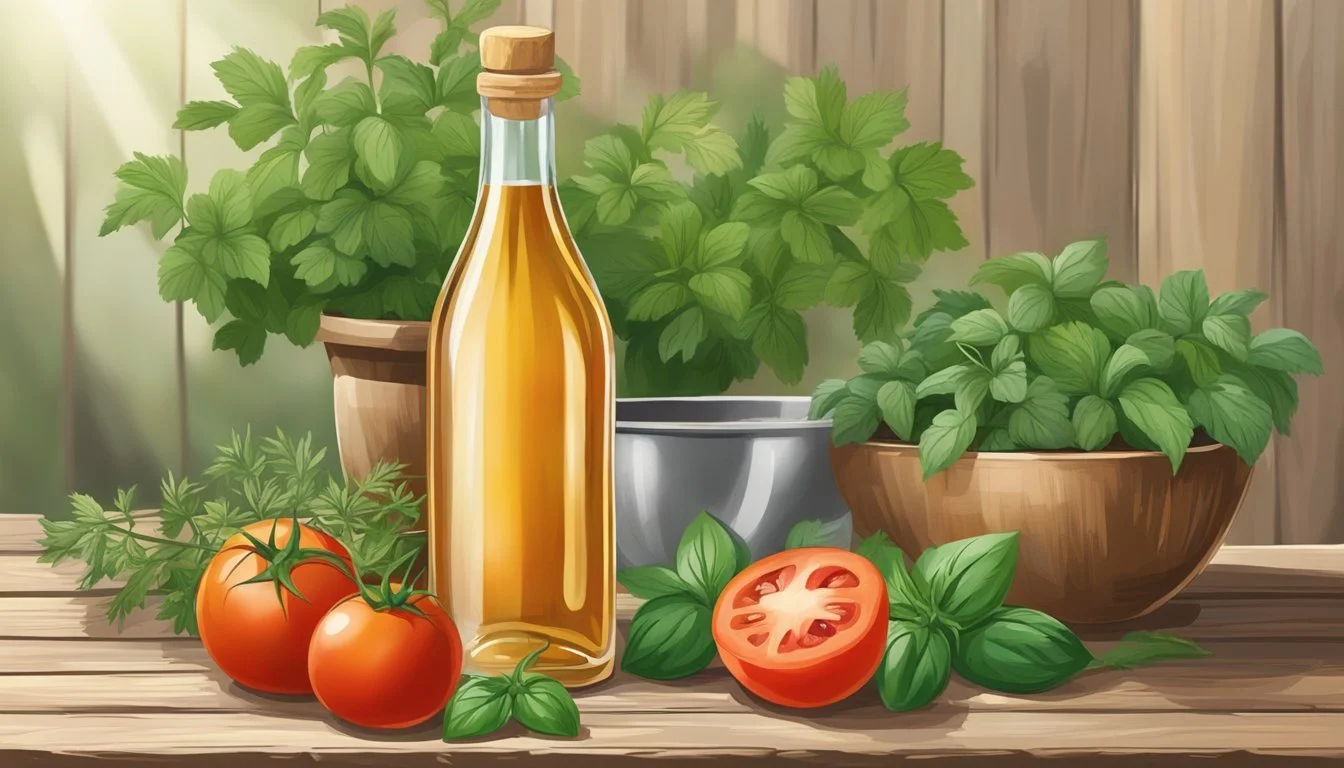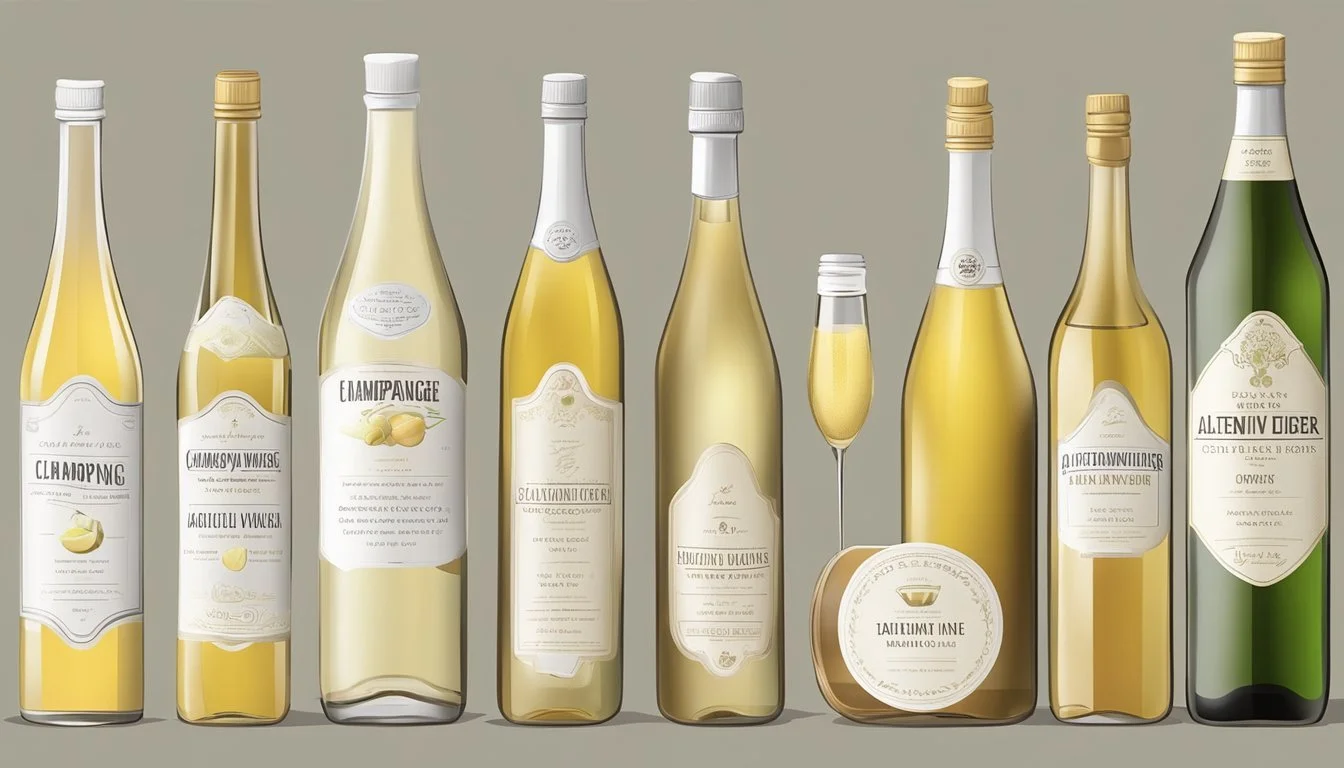Champagne Vinegar Substitutes
Top Alternatives for Your Recipes
Champagne vinegar, prized for its delicate fruity taste and mild acidity, has become a favorite ingredient among culinary enthusiasts for adding a bright touch to vinaigrettes, sauces, and marinades. Its unique flavor is derived from the same grapes used to produce champagne, making it a distinctive element in cooking. However, despite its popularity, champagne vinegar isn't always readily available in every kitchen pantry or local grocery store, leading cooks to seek suitable substitutes that can mirror its effect in dishes.
Finding an appropriate substitute for champagne vinegar depends on the intended use and desired outcome of the recipe. Several alternatives, such as white wine vinegar and apple cider vinegar, have been identified for their ability to replicate the acidic yet subtly sweet profile of champagne vinegar. These substitutes are not only more commonly found but also offer a similar balance of flavors, ensuring that the integrity of the dish remains intact. When using an alternative, adjustments like diluting with water or adding a touch of sugar may be considered to achieve the closest match to the original ingredient’s taste and acidity.
Understanding Champagne Vinegar
Champagne vinegar is a unique and sophisticated condiment, derived from the same grapes used in the beloved sparkling wine and known for its delicate and complex flavor profile.
Origins and Production
Champagne vinegar originates from the Champagne region of France, the same locale famed for producing champagne wine. This vinegar is typically made using Pinot Noir and Chardonnay grapes, which undergo a double fermentation process. Initially, the grapes ferment into champagne, and upon further fermentation, they transform into vinegar. The meticulous process contributes to the delicate taste and premium quality of champagne vinegar.
Culinary Uses
In the culinary world, chefs prize champagne vinegar for its ability to add a mild and sophisticated tartness to dishes. Its applications are diverse, including:
Salad dressings: Enhances greens and vinaigrettes with a light acidity.
Marinades: Tenderizes meats while infusing them with flavor.
Sauces: Imparts a subtle tang without overpowering other ingredients.
Flavor Profile
The flavor profile of champagne vinegar stands out due to its relatively mild acidity and slight sweetness. It possesses a complex flavor that is less sharp than white or red wine vinegar, making it a preferred choice for those seeking a more delicate vinegar. This nuanced taste profile allows it to complement ingredients rather than overshadow them, which is why it's frequently used to balance out flavors in a dish.
Choosing Champagne Vinegar Substitutes
When selecting a substitute for champagne vinegar, one should consider the crucial attributes of taste and acidity level to ensure the closest match possible.
Factors to Consider
When choosing a substitute for champagne vinegar, individuals must evaluate several factors to find an ideal match. Flavor profile is paramount; champagne vinegar is known for its light, fruity, and slightly sweet flavor that should not overpower the dish. Acidity comes next, as champagne vinegar has a moderate acidity that provides a clean, crisp taste without the harshness of other vinegars. Lastly, the sweetness level plays a role; the mild sweetness of champagne vinegar should be mirrored by its substitute to maintain a balanced flavor in recipes.
Substitute Variety
Identifying suitable substitutes for champagne vinegar involves recognizing options that closely align with the original in both flavor and acidity. Below is a list of alternatives:
White Wine Vinegar: It closely resembles champagne vinegar in fruitiness and acidity, yet may lack some sweetness.
To substitute: Equal parts white wine vinegar for champagne vinegar.
Apple Cider Vinegar: Widely available, it brings a different but pleasant fruitiness with a touch higher acidity.
To substitute: Equal parts, but may add a pinch of sugar to match sweetness.
Herb Vinegar: Made with a base of white vinegar, it offers a more complex flavor but lacks the sweetness of champagne vinegar.
To substitute: Use equal parts, consider adding a teaspoon of honey or sugar to enhance sweetness.
Substitute Equal Parts? Add Sweetener? White Wine Vinegar Yes No Apple Cider Vinegar Yes Optional Herb Vinegar Yes Yes
In each case, the substitute should not be overly delicate nor should it commandeer the flavor profile of the dish. Careful tuning of the proportions may be necessary depending on the recipe and desired outcome.
Common Substitutes
In the absence of champagne vinegar, several alternatives offer a similar balance of acidity and a hint of sweetness to recipes. These common substitutes, each with their distinctive qualities, can closely mimic the fruity and tangy profile of champagne vinegar.
White Wine Vinegar
White wine vinegar stands out as a fitting alternative due to its comparable color and acidity. It lacks the slightly sweeter note of champagne vinegar but works well in dressings and marinades where a light, wine-infused flavor is desired.
Acidity: High
Flavor Profile: Tangy with a less sweet undertone
Best Used in: Vinaigrettes, marinades, and sauces
Apple Cider Vinegar
Apple cider vinegar provides a fruitier taste that can complement dishes requiring the lightness of champagne vinegar. It offers a modest sweetness and is widely available, making it a convenient substitute.
Acidity: Moderate to high
Flavor Profile: Fruit-forward with a hint of sweetness
Best Used in: Fruit-based dishes, slaws, and chutneys
Red Wine Vinegar
Red wine vinegar, although deeper in color, can suitably replace champagne vinegar when a robust flavor profile is acceptable. Its acidity is balanced with a subtle fruitiness, and it lends itself well to heartier dishes.
Acidity: Robust
Flavor Profile: Slightly fruity and bold
Best Used in: Meat marinades, stews, and pickling
Rice Vinegar
Rice vinegar is milder and sweeter than champagne vinegar, offering a delicate flavor suitable for dishes that benefit from a less pronounced vinegar presence. It is often used in Asian cuisine and can serve as a gentle substitute.
Acidity: Mild
Flavor Profile: Subtly sweet and mellow
Best Used in: Asian-inspired sauces, dressings, and sushi rice
Each substitute offers a unique dimension of taste, and the choice should complement the overall flavor profile of the dish being prepared.
Specialty Vinegar Substitutes
When champagne vinegar is unavailable, a variety of specialty vinegars can be used to match the intended flavor profile in both sweet and savory dishes. Each substitute has distinct characteristics that can complement the original ingredient in different ways.
Sherry Vinegar
Sherry Vinegar is praised for its rich, nutty flavor, which stands out in comparison to the light and delicate taste of champagne vinegar. It can bring a robust depth to marinades and dressings. For best results, one should consider mixing sherry vinegar with a pinch of sugar to balance its intensity.
Balsamic Vinegar
With a complex flavor that veers towards sweetness, Balsamic Vinegar adds a fruity note reminiscent of grape must. Due to its bold and concentrated nature, it should be used sparingly to avoid overpowering the dish. It works exceptionally well in reductions and glazes where its sweetness can be a feature rather than a drawback.
Raspberry Vinegar
Raspberry Vinegar offers a fruity and tangy profile similar to champagne vinegar, making it a suitable substitute in vinaigrettes and light sauces. Its berry notes can complement fruit-based salads or desserts that require a touch of acid with a subtle hint of sweetness.
Herb Vinegar
One can infuse vinegars with a variety of herbs to create an Herb Vinegar that aligns closely with the desired flavor in a recipe that calls for champagne vinegar. Herb vinegars are particularly versatile in savory dishes, adding both the sharpness of vinegar and the aromatic qualities of herbs such as tarragon, dill, or basil.
Non-Vinegar Alternatives
When seeking to replicate the tangy, yet delicately fruity flavor profile of champagne vinegar without using traditional vinegars, chefs often turn to citrus juices and white balsamic vinegar for their unique characteristics. These alternatives add a fresh brightness to dishes that champagne vinegar typically would, while also being less acidic.
Citrus Juices
Lemon Juice and Lime Juice: These citrus juices are often used for their fresh, zesty flavor which can mimic the brightness of champagne vinegar in a dish. Lemon juice offers a crisp, clean taste, whereas lime juice provides a slightly more tropical, zesty quality. Utilize these juices to enhance the flavors in salads, marinades, and sauces where one would typically use champagne vinegar.
Similarities with Champagne Vinegar:
Provides freshness and acidity to dishes
Can brighten up the flavors simi larly to champagne vinegar
Usage:
Dressings and marinades: 1 tablespoon of lemon or lime juice for every tablespoon of champagne vinegar
Balance with a sweet component due to higher acidity
White Balsamic Vinegar
White Balsamic Vinegar: White balsamic vinegar, though still a vinegar, is a milder and somewhat sweeter alternative. It imparts a less aggressive tang and maintains the aesthetic of a dish better than darker vinegars due to its transparent color.
Characteristics:
Milder and slightly sweeter compared to champagne vinegar
Adds a mild tangy flavor without overpowering other ingredients
Usage:
A one-to-one substitute in dressings, sauces, or glazes
Best used when a subtle hint of acidity is desired without altering the appearance of the final dish
Homemade Champagne Vinegar Recipes
Making homemade champagne vinegar involves two primary methods: creating vinegar from scratch and mixing vinegar blends. Both approaches allow for a unique twist on traditional recipes and can be particularly useful in dishes like stir-fries that benefit from a distinct vinegar profile.
Creating Vinegar from Scratch
To create champagne vinegar from scratch, one needs a starter culture often referred to as a 'mother of vinegar', and some leftover champagne. This process involves:
Preparing the Champagne: Ensure the champagne is at room temperature.
Combining with the Mother: Add the starter culture to the champagne.
Fermentation: Transfer the mixture to a clean jar and cover it with cheesecloth. Store in a dark, warm place for about 2-4 weeks, stirring occasionally.
Completion: Once the vinegar tastes tangy and acidic, it's ready to be strained and stored.
At this stage, the homemade champagne vinegar can be used as is or further refined to match one's taste preferences.
Mixing Vinegar Blends
Those seeking a quicker solution can mix existing vinegars to approximate the flavor of champagne vinegar. This involves:
Selecting the Vinegar Base: White wine vinegar is a suitable base due to its similar flavor profile.
Vinegar Base Water Sweetener ¾ cup Vinegar ¼ cup A pinch
Mixing the Ingredients: Combine the base vinegar with a bit of water and a pinch of sugar to mellow the sharpness.
Taste and Adjust: Start with the suggested ratio and adjust to your taste.
This blend is excellent for quick recipes like stir-fries, where a splash of subtle acidity can make a significant difference.
Application Tips for Substitutes
When substituting champagne vinegar, it's important to match the substitute's flavor profile and acidity with the intended application to maintain the integrity of the dish.
Vinaigrettes and Salad Dressings
For vinaigrettes and salad dressings that call for a light, fruity tang, white wine vinegar stands as a favorable choice. It offers a similar fruity note and can be directly substituted in a 1:1 ratio. For example, in a classic garden salad dressing, if the recipe calls for 1 tablespoon of champagne vinegar, use 1 tablespoon of white wine vinegar as a straightforward swap. This will maintain the desired tangy flavor without overpowering the freshness of the garden greens.
Marinades and Sauces
When preparing marinades and sauces, especially for proteins like chicken or fish, apple cider vinegar can serve as a commendable alternative. Its sweetness and a fruitier undertone can complement the natural flavors of the meat. In marinades, substitute equal amounts of apple cider vinegar for champagne vinegar to achieve a slight apple inflection that pairs well with the savory notes of chicken or fish.
Glazing and Pickling
For glazing and pickling, a subtler yet tangy flavor is ideal. In these instances, consider mixing white vinegar with a pinch of sugar to mimic champagne vinegar's delicate taste. Start with ¾ part vinegar to ¼ part water, adjusting the sweetness with sugar to taste. This blend can be used in equal parts to the champagne vinegar called for in the recipe, ensuring the glaze or pickling liquid imparts that essential tanginess without being overly acidic.
Complementary Flavors and Pairings
When substituting Champagne vinegar, it's essential to consider how the alternative's flavor profile harmonizes with specific herbs, meats, and vegetables. The substitute should match the vinegar’s characteristic delicate acidity and hint of fruity notes to maintain the integrity of the dish.
Pairing with Herbs
Champagne vinegar's soft nature pairs well with herbs such as rosemary and thyme. Rosemary’s robust flavor complements acidic dressings without overpowering the dish, while thyme offers a subtle lemony undertone that echoes the mild fruitiness of Champagne vinegar.
Rosemary: Ideal for vinaigrettes applied to roasted vegetables.
Thyme: Best paired with vinegars in marinades for poultry.
Matching with Meats
In savorý dishes, the chosen substitute should not overwhelm the meat but rather enhance its flavor. Meats like chicken or fish benefit from a vinegar that provides a zesty touch without too much sharpness, maintaining that unique balance found in Champagne vinegar.
Chicken: A light vinegar substitute keeps the chicken's flavor at the forefront.
Fish: A milder acidic component with a hint of sweetness can complement the delicate nature of fish.
Vegetable Accents
Vegetables are elevated by vinegars that carry a delicate and less intrusive profile. Substitutes should be mild enough to not mask the natural flavors of the vegetables while still adding an appreciable depth.
Leafy Greens: A mild vinegar with fruity notes accentuates without dominating.
Roasted Vegetables: Use a subtle yet flavorful vinegar to enhance natural sweetness.








